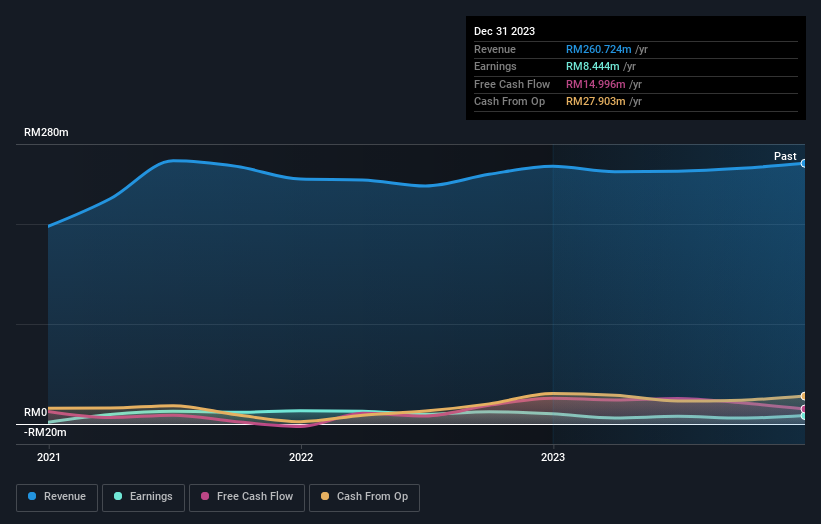Insiders were the biggest winners as GE-Shen Corporation Berhad's (KLSE:GESHEN) market cap grew by RM125m last week
Key Insights
GE-Shen Corporation Berhad's significant insider ownership suggests inherent interests in company's expansion
The top 2 shareholders own 55% of the company
Past performance of a company along with ownership data serve to give a strong idea about prospects for a business
A look at the shareholders of GE-Shen Corporation Berhad (KLSE:GESHEN) can tell us which group is most powerful. And the group that holds the biggest piece of the pie are individual insiders with 44% ownership. That is, the group stands to benefit the most if the stock rises (or lose the most if there is a downturn).
Clearly, insiders benefitted the most after the company's market cap rose by RM125m last week.
In the chart below, we zoom in on the different ownership groups of GE-Shen Corporation Berhad.
See our latest analysis for GE-Shen Corporation Berhad
What Does The Lack Of Institutional Ownership Tell Us About GE-Shen Corporation Berhad?
Small companies that are not very actively traded often lack institutional investors, but it's less common to see large companies without them.
There are multiple explanations for why institutions don't own a stock. The most common is that the company is too small relative to funds under management, so the institution does not bother to look closely at the company. It is also possible that fund managers don't own the stock because they aren't convinced it will perform well. Institutional investors may not find the historic growth of the business impressive, or there might be other factors at play. You can see the past revenue performance of GE-Shen Corporation Berhad, for yourself, below.
GE-Shen Corporation Berhad is not owned by hedge funds. Our data shows that Shanghai JM Development Sdn Bhd is the largest shareholder with 29% of shares outstanding. Choong Chan is the second largest shareholder owning 26% of common stock, and Hai Lee holds about 4.7% of the company stock. Hai Lee, who is the third-largest shareholder, also happens to hold the title of Member of the Board of Directors. Additionally, the company's CEO Puong Lau directly holds 1.9% of the total shares outstanding.
A more detailed study of the shareholder registry showed us that 2 of the top shareholders have a considerable amount of ownership in the company, via their 55% stake.
While studying institutional ownership for a company can add value to your research, it is also a good practice to research analyst recommendations to get a deeper understand of a stock's expected performance. As far as we can tell there isn't analyst coverage of the company, so it is probably flying under the radar.
Insider Ownership Of GE-Shen Corporation Berhad
The definition of company insiders can be subjective and does vary between jurisdictions. Our data reflects individual insiders, capturing board members at the very least. Management ultimately answers to the board. However, it is not uncommon for managers to be executive board members, especially if they are a founder or the CEO.
Most consider insider ownership a positive because it can indicate the board is well aligned with other shareholders. However, on some occasions too much power is concentrated within this group.
Our most recent data indicates that insiders own a reasonable proportion of GE-Shen Corporation Berhad. Insiders own RM226m worth of shares in the RM518m company. This may suggest that the founders still own a lot of shares. You can click here to see if they have been buying or selling.
General Public Ownership
With a 25% ownership, the general public, mostly comprising of individual investors, have some degree of sway over GE-Shen Corporation Berhad. While this group can't necessarily call the shots, it can certainly have a real influence on how the company is run.
Private Company Ownership
Our data indicates that Private Companies hold 31%, of the company's shares. It might be worth looking deeper into this. If related parties, such as insiders, have an interest in one of these private companies, that should be disclosed in the annual report. Private companies may also have a strategic interest in the company.
Next Steps:
While it is well worth considering the different groups that own a company, there are other factors that are even more important. Case in point: We've spotted 3 warning signs for GE-Shen Corporation Berhad you should be aware of, and 1 of them can't be ignored.
Of course this may not be the best stock to buy. Therefore, you may wish to see our free collection of interesting prospects boasting favorable financials.
NB: Figures in this article are calculated using data from the last twelve months, which refer to the 12-month period ending on the last date of the month the financial statement is dated. This may not be consistent with full year annual report figures.
Have feedback on this article? Concerned about the content? Get in touch with us directly. Alternatively, email editorial-team (at) simplywallst.com.
This article by Simply Wall St is general in nature. We provide commentary based on historical data and analyst forecasts only using an unbiased methodology and our articles are not intended to be financial advice. It does not constitute a recommendation to buy or sell any stock, and does not take account of your objectives, or your financial situation. We aim to bring you long-term focused analysis driven by fundamental data. Note that our analysis may not factor in the latest price-sensitive company announcements or qualitative material. Simply Wall St has no position in any stocks mentioned.

 Yahoo Finance
Yahoo Finance 

